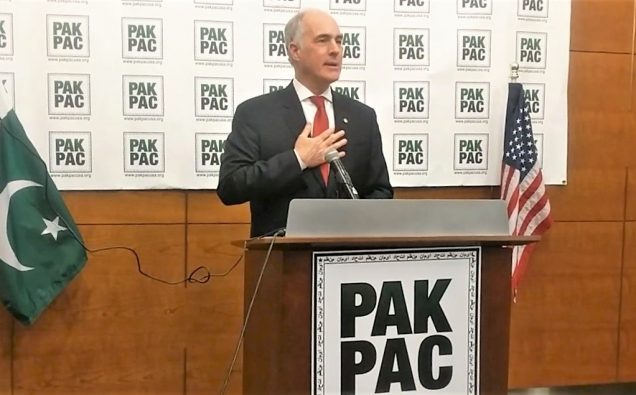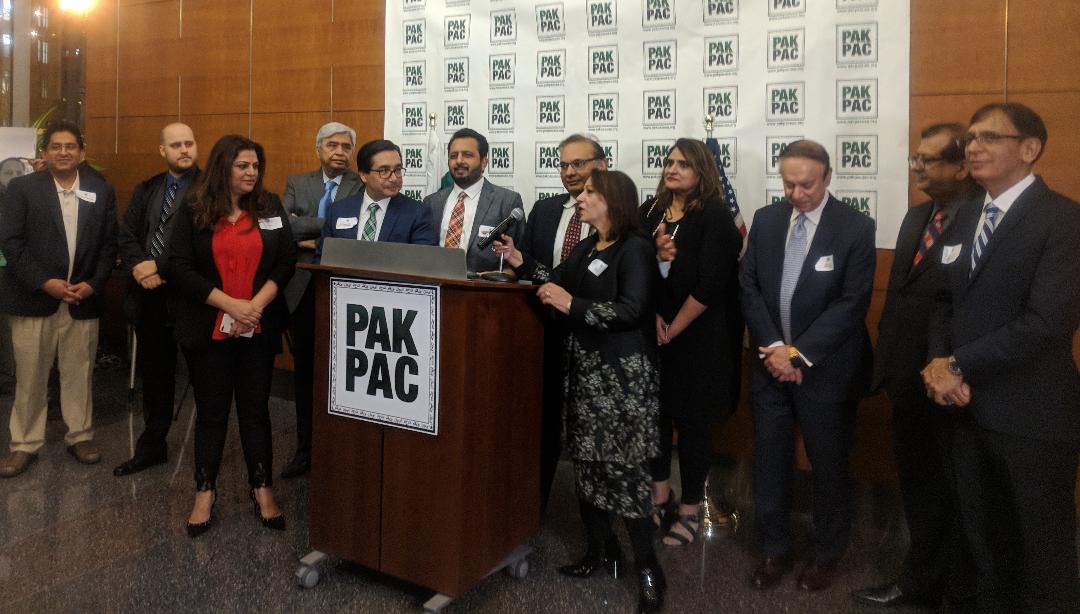
As the United States and Pakistan revive their coordination on finding a political settlement to the Afghan conflict, several American lawmakers have expressed their support for rebuilding U.S.-Pakistan ties with cooperation in areas of convergence.
The lawmakers spoke at an event that Pakistani-American Political Action Committee (PAKPAC) hosted to welcome members of the 116th Congress.
The event near Capitol Hill drew a bipartisan participation of 20 lawmakers – marking a remarkable occasion as it took place in the backdrop of a tense 2018 year for U.S.-Pakistan relations.
Throughout last year that began with President Donald Trump’s twitter allegations against Pakistan, both sides expressed discontent with the state of the relationship, often described as critical to prosecution of fight against terrorists in Afghanistan and the region. Washington has stopped military assistance for Pakistan – a major point of leverage for the U.S. in the post-9/11 phase of close engagement between the two countries.
The relationship has been complicated at times due to a variety of reasons including the Afghan war controversies and has also been characterized as transactional because it often revolves around quid pro quo arrangements.
It has only been in the last few months that Washington and Islamabad – that remained strategic allies during much of the last decade since 9/11 terrorist attacks – have agreed to step up mutual cooperation to push an Afghan peace process.
The cooperation between the Trump Administration and PM Imran Khan-led Pakistani government indicates the mutual desire on part of both to end the 18-year-old conflict in landlocked Afghanistan through a negotiated settlement between the Afghan Taliban and U.S.-backed government in Kabul.
In his remarks at the event Bob Casey, a Democratic Senator from Pennsylvania, acknowledged the need to be clear about challenges that the two sides have had to contend with in the high-stakes relationship.
“I know this relationship hasn’t always been seamless, and without tension. Let’s be honest about it,” Casey noted.
“But there are a lot of ways when our governments are working together and cooperating whether that is counterterrorism and economic development
“We want to emphasize those areas of agreement, unanimity and common ground,” the he told the gathering of influential Pakistani-Americans.
The senator appreciated PAKPAC leader Riffat Chughtai and Pakistani-Americans for their contributions towards bringing the two countries together and connecting American communities.
Senator Casey’s reference to U.S.-Pakistan cooperation on counterterrorism and economic development reflects two countries’ top priorities – with the U.S. needing Pakistani cooperation on fighting terrorism and Pakistan needing U.S. support for its economic development.
Senator Shaheen, a member of the Senate Subcommittee on Near Eastern and South and Central Asian Affairs, shared the view on revitalizing the U.S.-Pakistan relationship – considered key to the future of Afghanistan and South Asian peace.
“I think it is important for us to figure out how to right the relationship, so that we can continue to be very strong allies,” she said in an interview.
The PAKPAC event featured an array of lawmakers that reflected multicultural mosaic of the society and diversity in the new U.S. House of Representatives that includes political voices from diverse communities and faiths.
Democrats Rashida Tlaib and Ilhan Omar, who made history with their elections in November 2018, pledged efforts toward welfare of common Americans. Andre Carson, another Muslim member of the House, said American Muslims should expand their representation on the Capitol Hill.
The members of Congress, who attended the event also included Elissa Slotkin, Susan Wild, Madeleine Dean, Greg Stanton, Steven Horsford, Raja Krishnamoorthi, Mary Gay Scanlon, Andy Levin, and Max Rose, and Republicans Joe Wilson, Jack Bergman, Brian Fitzpatrick and Jim Banks.

PAKPAC President Riffat Chughtai announcing appointment of regional heads of the advocacy organization














